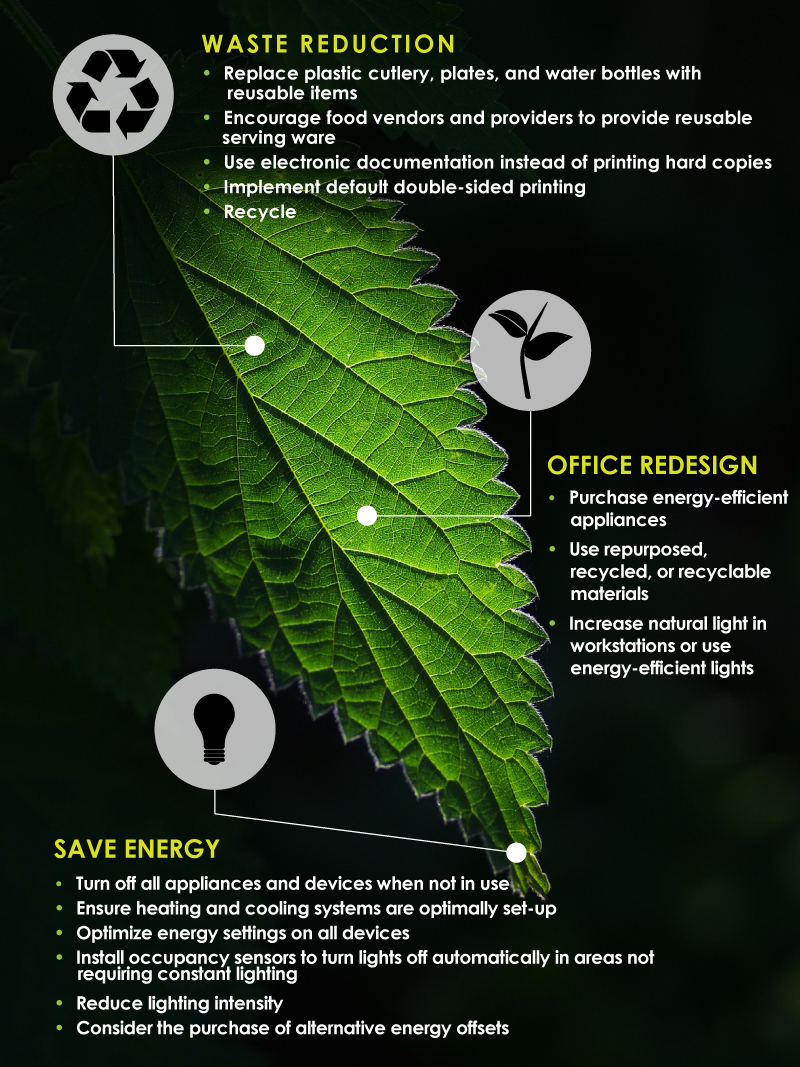Consideration of sustainability and environmental impact is essential to ensure a company’s long-term success, growth, and viability. The benefits of instituting sustainable workplace practices, such as managing energy use, include reduced operating costs, increased market competitiveness, and the conservation of natural resources, thereby increasing overall efficiency. Through consistent energy management, companies reduce expenses by an average of 30%.
In the last decade, the demand for working with sustainable businesses has doubled and has become a critical factor in determining preferred industry partners and making purchasing decisions. Clients value and trust “green” businesses because they have undertaken a social responsibility not only to preserve the environment, but also to optimize environmentally friendly practices in their internal operations and, in so doing, encourage other businesses and communities to adopt similar approaches. Sustainably committed firms, instead of focusing on short-term profitability, emphasize the achievement of long-term objectives.
By adopting an environmentally conscious business strategy, companies reduce internal consumption and conserve scarce natural resources—while ultimately improving their bottom line.
What is Workplace Sustainability?
According to the United Nations World Commission on Environment and Development, sustainability “is the ability to meet the needs of the present without compromising the ability of future generations to meet their needs.”
Companies must consider the needs of the triple bottom line—people, planet, and profit—when developing their mission, goals, and practices. For sustainable outcomes to be achieved, businesses must operate in a manner that fulfills and balances all three of these needs. Executing business strategy that restores and enhances company objectives, community building, and environmental preservation creates stakeholder value and contributes to the prosperity of current and future generations.

Tips/Suggestions:
Office Redesign
- Purchase energy-efficient appliances
- Use repurposed, recycled, or recyclable materials
- Ex: Recycled glass worktops; responsibly sourced wood; salvaged materials (doors, mechanical devices, lighting, ceiling tile)
- Increase natural light in workstations or use energy-efficient lights
- Ex: LED lights, glass panels in offices (to offer privacy while encouraging flow of daylight), low workstation panels in open office areas, daylight harvesting
Waste Reduction
- Replace plastic cutlery, plates, and water bottles with reusable items
- Ex: Offer ceramic plates, glass cups, and stainless-steel silverware
- Encourage food vendors and providers to provide reusable serving ware
- Implement default double-sided printin
- Recycle
- Ex: Paper, printer cartridges, plastic and glass bottles, electronic devices (inquire with your municipality)
Save Energy
- Turn off all appliances and devices when not in use
- Ex: Have a rule that the last person to leave turns off all lights
- Ensure heating and cooling systems are optimally set-up
- Optimize energy settings on all devices
- Install occupancy sensors to turn lights off automatically in areas not requiring constant lighting
- Reduce lighting intensity
- Consider the purchase of alternative energy offsets
DBI offers extensive expertise about sustainable business practices. As a member of the US Green Building Council and having several LEED®-accredited designers on staff, DBI is attuned to the ever-increasing importance of, and the urgent need for, meaningful environmental changes that businesses can undertake.
Click here to learn more about sustainability practices at DBI.
